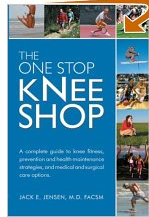Knee Health
The below provides a general overview on this topic and may not apply to everyone. Any treatment protocol should be discussed with a qualified healthcare practitioner. Please refer to: Medical & Legal Disclaimer

🎯 Managing the Pain
Massages: Endorphins are released during a massage, and these endorphins prevent nerve cells from releasing more pain signals.
Not everybody likes the idea of acupuncture (which is also very helpful in controlling pain) or has the funds for regular professional massages. However, there are a wide range of home-use massage tools and devices that give you access to a healing massage whenever you need relief in the comfort of your home.
Please click here for information on the benefits of massage.
🥗 Knee Health Nutrition
Also refer to: "Bone Health" • Arthritis • Joint Pain / Health (for further research and nutritional recommendations)
🍊 Vitamin C
Moderate to severe knee osteoarthritis is on the rise due to an aging population and increasing rates of obesity. A recent study suggests that fruits with high vitamin C content can improve bone health of the knee.
🔬 10-Year Study Results
Study Size: Nearly 300 healthy adults
Duration: 10 years
Focus: Bone marrow lesions (osteoarthritis markers)
Result: Increased Vitamin C intake linked to 50% less risk of bone marrow lesions
☀️ Vitamin D
Previous research linked higher vitamin D levels to improved muscle strength and function in the knee.
📚 Research Sources
- • "Effects of Antioxidants on Knee Cartilage and Bone in Healthy, Middle-aged Subjects" by Y. Wang et al, Arthritis Res. Ther. 7/6/07
- • "Vitamin D Improves Symptoms of Knee Osteoarthritis," www.nutraingredients.com, 10/21/04
🧬 MSM (Methylsulfonylmethane)
MSM provides sulfur, a vital building block of joints, cartilage, skin, hair and nails, and methyl groups, which support many vital biochemical processes including energy production. Published, peer-reviewed clinical research has shown MSM is safe and effective in increasing joint comfort and supporting normal range of motion.
🔬 Clinical Research Summary
MSM can be taken alone or in combination with glucosamine and chondroitin. It's naturally-occurring in small amounts in many foods, but as a supplement, it's synthesized to be identical to natural MSM.
📊 Clinical Research & Human Trials
🏥 MSM in Knee Osteoarthritis Pain (2006)
Study Design
- • Randomized, double-blind, placebo-controlled
- • 3,000mg MSM twice daily vs placebo
- • 12-week duration
- • Mild to moderate knee osteoarthritis
Key Results
- • Statistically significant pain reduction
- • Improved daily living activities
- • Reduced serum homocysteine (heart health)
- • Reduced urinary malondialdehyde (oxidative stress)
- • No significant adverse events
Source: Kim LS, Axelrod LJ, Howard P, et al. "Efficacy of methylsulfonyl-methane (MSM) in osteoarthritis pain of the knee: a pilot clinical trial." Osteoarthritis and Cartilage 2006;14:286–94. Southwest College Research Institute.
🔬 MSM + Glucosamine Combination Study (2004)
Study Groups
- • MSM alone
- • Glucosamine alone
- • MSM + Glucosamine
- • Placebo
~30 patients per group, 12 weeks, 1,500mg/day
Measurements
- • Pain index
- • Swelling index
- • Visual analogue scale pain
- • 15m walking time
- • Lequesne index
Key Finding
Combination therapy showed better efficacy in reducing pain and swelling and improving functional ability than individual agents alone.
Source: Usha PR, Naidu MUR. "Randomised, double-blind, parallel, placebo-controlled study of oral glucosamine, methylsulfonylmethane and their combination in osteoarthritis." Clin Drug Invest 2004; 24:353–63.
🌿 MSM for Seasonal Allergic Rhinitis (2002)
Study Details
- • Open-label study
- • 55 patients with seasonal allergic rhinitis
- • 2,600mg MSM daily
- • Tracked respiratory symptoms
Results
- • Significant reduction in upper/total respiratory symptoms within 7 days
- • Lower respiratory symptoms improved by week 3
- • Energy levels increased significantly by day 14
- • Few side effects, no dropouts due to adverse reactions
Source: Barrager E, Veltmann JR, Schauss AG, Schiller RN. "A multi-centered, open label trial on the safety and efficacy of methylsulfonylmethane in the treatment of seasonal allergic rhinitis." J Altern Complement Med 2002;8:167–74.
🧠 MSM in Human Cerebrospinal Fluid & Blood Plasma (2005)
Advanced NMR spectroscopy study confirmed MSM (dimethyl sulfone) occurs as a regular metabolite at low micromolar concentrations in cerebrospinal fluid and plasma.
Key Findings
- • MSM concentration in plasma and CSF: 0-25 micromol/l in healthy controls
- • Derives from dietary sources, intestinal bacterial metabolism, and human endogenous metabolism
- • Confirmed MSM as natural human metabolite
Source: Engelke UF, Tangerman A, Willemsen MA, et al. "Dimethyl sulfone [MSM] in human cerebrospinal fluid and blood plasma confirmed by one-dimensional (1)H and two-dimensional (1)H-(13)C NMR." NMR Bio Med 2005;18:33l–6. Radboud University Nijmegen Medical Centre.
🥬 Natural MSM in Foods (1981)
Foods Containing Natural MSM
Vegetables
- • Asparagus
- • Alfalfa
- • Beets
- • Cabbage
- • Cucumber
- • Swiss chard
- • Tomatoes
Grains & Fruits
- • Corn
- • Oats
- • Apples
- • Raspberry
Beverages
- • Beer
- • Coffee
- • Milk
- • Tea
Source: Pearson TW, Dawson HJ, Lackey HB. "Natural occurring levels of dimethyl sulfoxide in selected fruits, vegetables, grains and beverages." J Agric Food Chem 1981; 29:1019–21. Crown-Zellerbach study.